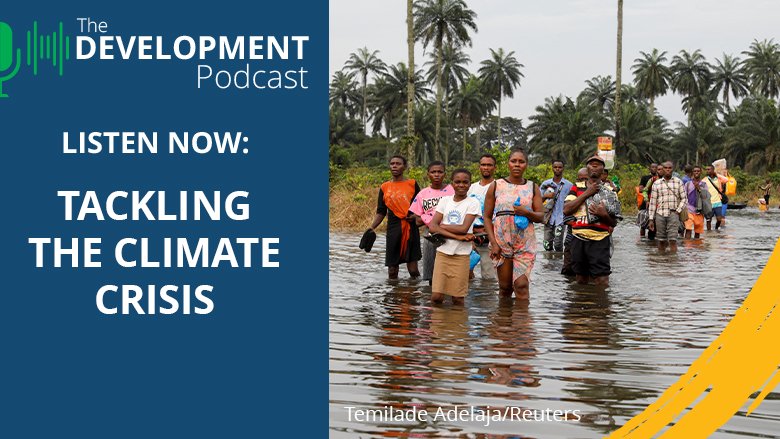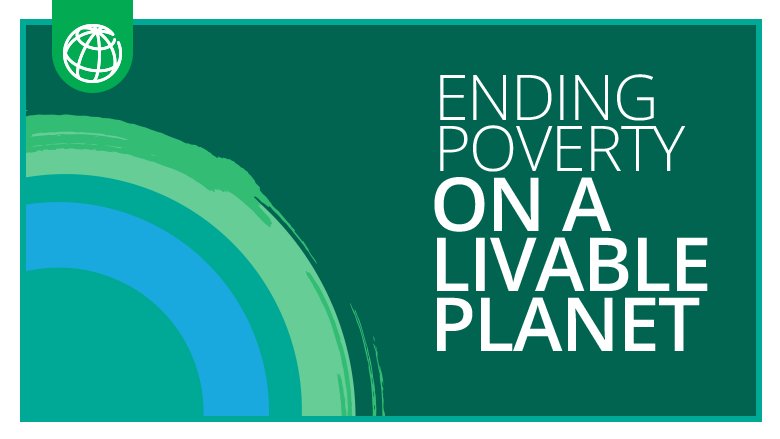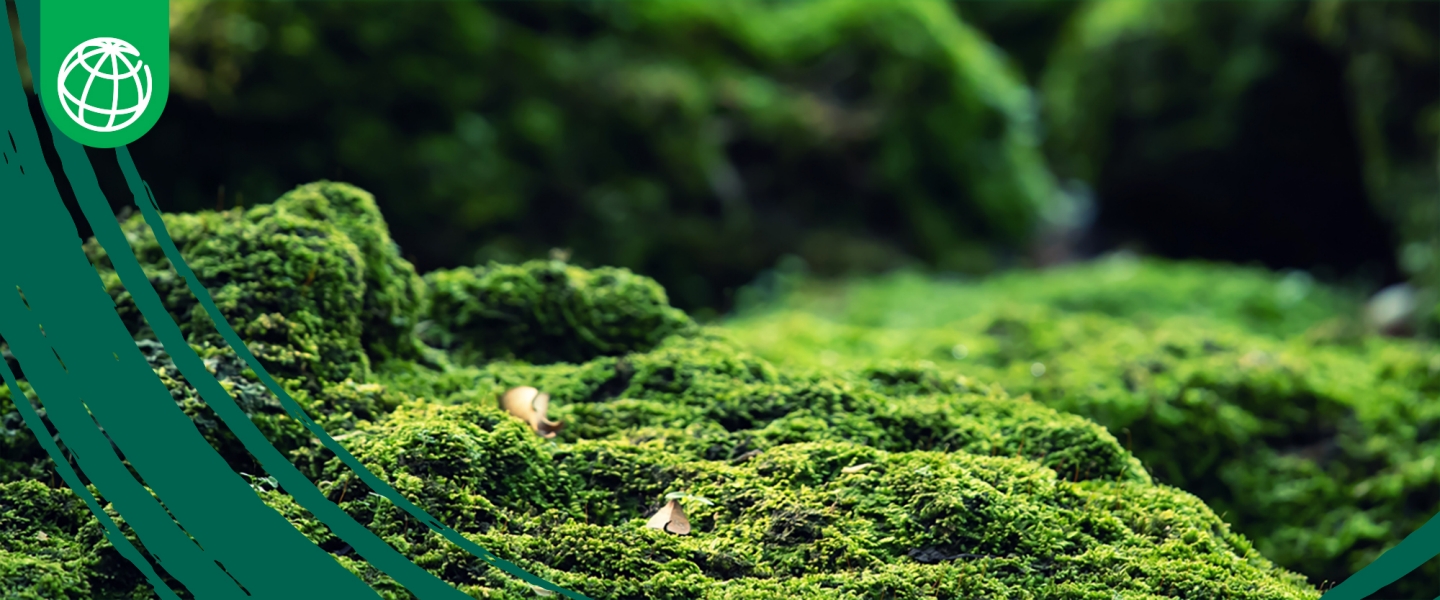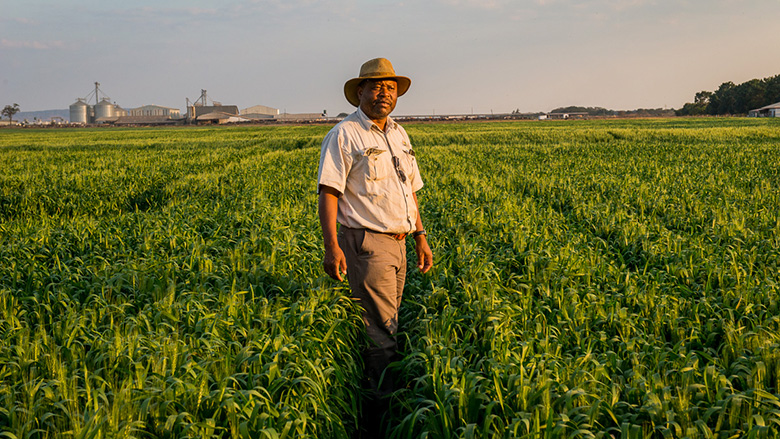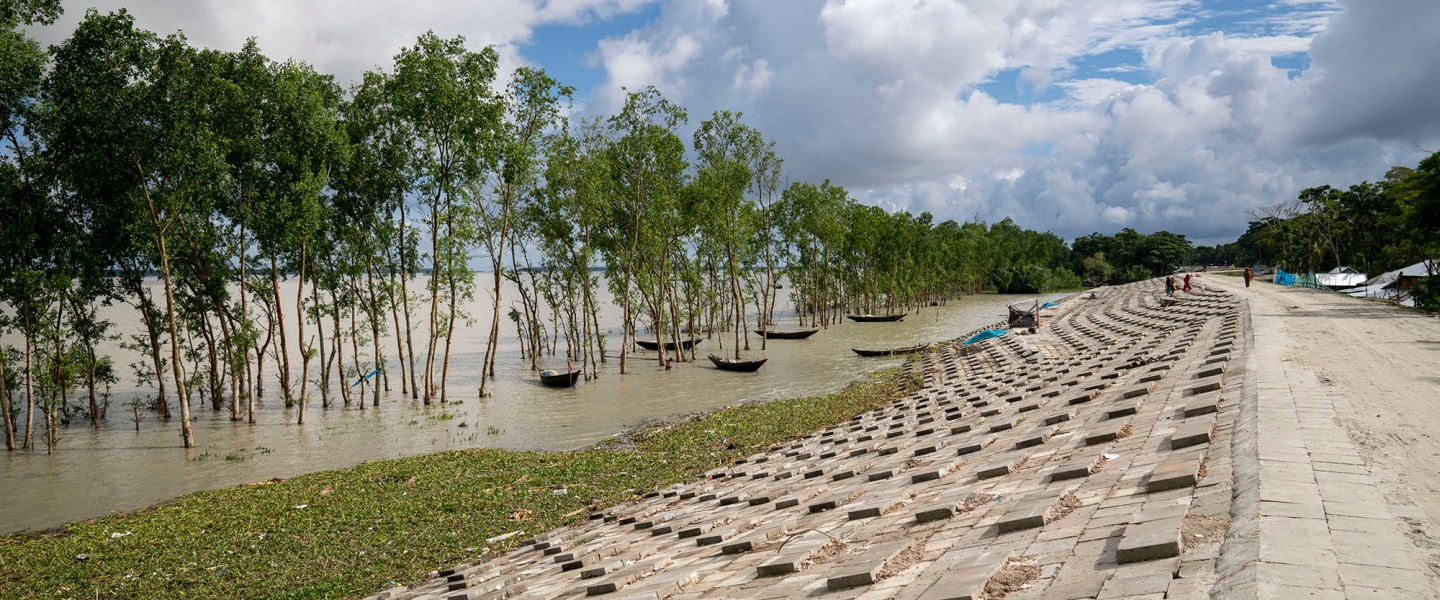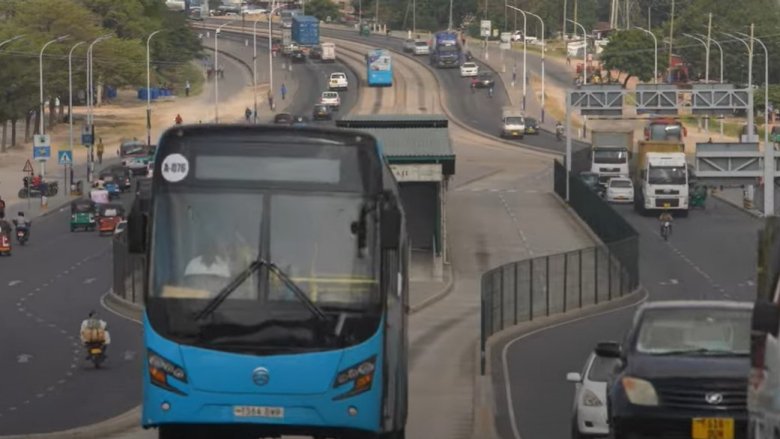The 28th UN Climate Change Conference (COP 28) comes at the heels of the hottest year in human history. Our newest episode of The Development Podcast delves into the impact of the climate crisis and urgent solutions to address it. This episode marks the launch of our new limited series on how to create a world free of poverty on a livable planet. Over the next 5 episodes, we’ll explore critical issues affecting planet, people and prosperity.
Today, we turn our attention to the planet as we speak with three high-profile guests about climate change. We'll also hear from a climate advocate in Samoa and other youth activists. Join us as we speak to Her Excellency, Hon. Fiamē Naomi Mata'Afa, Prime Minister and Minister for Foreign Affairs and Trade of Samoa on how the fallout of climate change impacts Small Island Developing States; Inger Andersen, Executive Director of the UN Environment Programme (UNEP) on emissions reduction and climate solutions; the World Bank’s Anna Bjerde, Managing Director of Operations, on the Bank’s role in climate action; and Brianna Fruean, a young climate advocate from Samoa who shares her own experiences.
Tell us what you think of our podcast here >>>. We would love to hear from you!
Featured Voices
- Her Excellency, Hon. Fiamē Naomi Mata'Afa, Prime Minister and Minister for Foreign Affairs and Trade of Samoa
- Inger Andersen, the United Nations Environment Programme (UNEP) Executive Director
- Anna Bjerde, Managing Director of Operations, World Bank
- Brianna Fruean, Climate Change Advocate, Samoa
Transcript
[00:00] Srimathi Sridhar: Hello everyone, and welcome back to The Development Podcast from the World Bank. I'm Srimathi Sridhar, coming to you from Washington, DC. This is the first of some very special episodes we've got for you here, where we're exploring how to end poverty on a livable planet, and what a livable planet really means. Today, we'll be turning our attention to climate change. And as I speak to you, the 28th UN Climate Summit, or COP28, is already underway. The focus there is on cutting emissions, adaptation, and solutions that can address the challenges of a world that is warming far too quickly. We'll hear about the urgent need for climate action from the Prime Minister of the Pacific Island Nation of Samoa.
Fiamē Naomi Mata'Afa: We know what the challenge is. We know the targets that we need to reach if we are to survive.
Srimathi Sridhar: From youth activists urging the international community to ensure a livable planet for their future.
Brianna Fruean: I felt like I was blessed to grow up in paradise, and a very big problem that I felt was about to take away this paradise for me was climate change.
Srimathi Sridhar: We'll get the big picture from the UN.
Inger Andersen: If we look at 10% of the highest income population, they are responsible for 48% of all emissions. The bottom 50% of the world population, they are responsible for just 12% of emissions. So, we have a lot of work to do.
Srimathi Sridhar: And we'll hear how the World Bank is tackling climate change head on.
Anna Bjerde: What gives me hope is that I feel that we know what the solutions are. We need to double down on them, accelerate them, push them, support them.
[02:37] Srimathi Sridhar: All that and more, coming up in The Development Podcast's special limited series on a livable planet. The climate crisis is about as urgent as a global issue can be. This year's COP summit in Dubai comes off the back of the hottest year on record, where forest fires, droughts, extreme weather and flooding became news day after day. The 2015 Paris Agreement target to limit global temperature increases to 1.5 degrees is a key benchmark. COP28 will see the first stock take of global climate action and the Paris Agreement. Climate change increases instability, conflict, hunger and threatens lives, livelihoods and biodiversity. It also disproportionately impacts the world's poor. For young people, especially those in parts of the world where climate change has a very visceral effect, the crisis is something they have grown up with, and many as our producer, Sarah Treanor found out, are using their voice to call for action.
Sarah Treanor: Pacific Island nations have been at the sharp edge of climate change for years, with rising sea levels, extreme weather and coastal erosion, to name but a few of the urgent challenges facing this group of small countries. For many young people, job prospects too have been impacted by the climate crisis. So, I spoke to one young activist who has been raising her voice on the issues facing her home country of Samoa since she was a small child.
Brianna Fruean: [foreign language]. My name is [foreign language] Brianna Fruean. So, [foreign language] is my Samoan chiefly name, and I do climate work.
Sarah Treanor: I asked Brianna to describe to me a sense of what it was like growing up.
Brianna Fruean: Picture perfect, picturesque, clear waters, white sandy beaches, type beach you see in a postcard. I was always surrounded by waterfalls and lush gardens and forests growing up. It really was as cliche as it sounds. I felt like I was blessed to grow up in paradise. And of course, not saying that paradise didn't have its problems, but a very big problem that I felt was, about to take away this paradise for me was climate change.
Sarah Treanor: Brianna said that she didn't really think about climate change.
Brianna Fruean: Until I learned about coral bleaching, and that's when everything clicked to me where I was thinking, "Okay, no wonder why the fish stock at the fish market is not looking the same as when I was five years old." And I would pick up on the conversations my dad would be having with the fishermen and the fisher folk saying that, "Oh, their boat couldn't make it further enough to catch more fish. Because of the warming oceans, the fish were going further and further out into the ocean." From these small little things like the visual change of fish stock to the big things like the cyclone and actually physically being in a cyclone, being in two and three cyclones from the age of 10 to the age of 15. And I would talk to my mom. She said that her first cyclone she experienced was when she was 19, and so I started to physically and emotionally encapsulate what climate change was because I realized that I was living in it.
Sarah Treanor: And is there an event you can recall, Brianna, where it really all started to seem very urgent?
Brianna Fruean: I think the first shift of land that I really had to deal with, or be a part of a conversation around it, was the shift in grave sites. So in Samoa, we believe that those who have passed on should be laid to rest with the best views. And so, a lot of our villages, we bury our ancestors near the ocean so that they have a view of the ocean. And then, I started hearing conversations in my family and my community of moving grave sites because the ocean was coming closer and closer and cracking the concrete of the graveyards. And that was the first shock to my system and the injustice for Samoan and Samoan family, to have to dig up their dead and move them and wake them from their rest.
Sarah Treanor: Brianna said that she's been traveling around the region to speak to other young Pacific Islanders about their lives, and that in some atoll nations, she's really felt the fragility of the land.
Brianna Fruean: And you do become very aware of the sound of the ocean. There's almost no escaping that sound. I was in Tuvalu when there was a cyclone in Fiji. One of the nights where the winds was really strong and there was a large tide in big waves that came crashing into the road, the rocks of the seawall completely scattered across the road. And I was on a motors bike with my cousins, and we were riding through and the wheels and my feet were touching ocean water because the ocean had completely come onto the road. And so, you become very aware of how, I guess, immediate and how urgent the climate crisis is for small atoll nations.
Sarah Treanor: I asked her to explain why she thinks culture and tradition are so intrinsically tied to the land in Samoa.
Brianna Fruean: There's so much that's interwoven together with language, the physical environment around us, the way we dance. It's all tied together with the land. So, the [foreign language], the dance of our culture, it mimics the way of the ocean. It mimics the actions of the birds and the sway of the leaves of the trees when it's windy out. And so, all of these elements that are a part of Samoa's land and Samoa's landscapes is interwoven and very much the roots of our dance. And the same goes for language. A lot of the words in which we used to express ourselves are the words of the trees, are the words that mean different animals and different insects. It's also deeply woven into our tattooing history. If you're looking after Samoan culture and people, you're looking after Samoa as the island and as the landscape
[08:41] Srimathi Sridhar: Thanks to Brianna and Sarah. Well, let's stay in this part of the world for a minute. I was honored to be joined by her Excellency, the Honorable Fiamē Naomi Mata'Afa, Prime Minister and Minister for Foreign Affairs and Trade of Samoa, who gave us a sense of how the region is impacted by the climate crisis.
Fiamē Naomi Mata'Afa: We have probably one of the smallest economic zones because of our geographical placing. We're sort of like in the middle of the Pacific Ocean. If there's a significant impact of climate change for our people here, the more immediate ones of course is the experience because most of our villages are coastal. It's very immediate. The other immediate impact, and I suppose this is also part of the development processes, the clearing of land, especially going upland where there is water catchment areas. There's the erosion then from the inline side where there's been encroachment on water catchment areas. So, it's a mix of climate change and development progress. The economies of small island states, they're really always on a back foot. So, to make that progress is very difficult. So perhaps, I could say, in the last 30 years since the early '90s, we've had about five major incidences in Samoa, related to climate change. Cyclones, heavy flooding. I don't think the tsunami we can count on climate change. You're always sort of on a back foot, because you're at least looking at the impact on us has to do with infrastructure and the blocking them of access, whether it's internal or external access, trading supplies, and so forth. And of course, not to mention the domestic costs to families with homes and private properties, and so forth.
Srimathi Sridhar: You mentioned homes and private properties. What are some infrastructure challenges, and how are you working with partners like the World Bank to overcome them?
Fiamē Naomi Mata'Afa: One of the major infrastructure projects, especially with the World Bank and other partners, is the main road between Apia, the capital, and the airport. So, that's a very key highway for connectivity, which also ties in with the airport developments and the ports on that side of the island that links where our pier is, to our other bigger island, Savai'i. So, all those projects are interwoven. We also have a number of what we call cross-island roads. And so, we have a major project that is just about to start that connects the north coast of this island, Tuvalu, to the southern coast. That will be quite a significant upgrade. For the big island in Savai'i, we of course have the roading infrastructure. The infrastructure there holds up quite well. But with Savai'i, there's been a large investment in water. We're possibly looking at a hydro project there, but there've been issues around landholding with the villages and the communities. So, I think we have to be a lot more inclusive in the consultation process so that communities understand the objective is to ensure our services to that large island. And that hydro really is perhaps one of the more sustainable renewable sources. But also, looking at models of how the communities themselves, because it is their customary land. How they can become shareholders, perhaps, in the modeling of how we can put together a large project.
Srimathi Sridhar: You're a trailblazer in regional politics, and the first female Prime Minister of Samoa. How do you see the role of women developing?
Fiamē Naomi Mata'Afa: So, when you look through the gender lens and the role and the function of women, it's still very much family-based. The social construct hasn't reached an economic stage where there are services that can take that burden off women, right? They still very much carry that with the impact of climate change, on top of it.
Srimathi Sridhar: And Prime Minister, what are other challenges that Samoa is facing, and what does it need to do to overcome them?
Fiamē Naomi Mata'Afa: It's education. It's very key. And unfortunately, talking about our SDGs and so forth, the indicators for us is not a positive one. I think we've lost some ground on that. And I think, as an incoming administration, we really have to return to those very basic tenets of development, to ensure at least an equity of development through the education process. The health area is still very much a challenge for Samoa. So, when you are looking at a population and their health statistics aren't good, and you're looking at the education, they're not good, then you really do need to revise where you put your priorities.
Srimathi Sridhar: And finally, it's COP28. What would be the strongest message you'd like to share with the international community and development institutions?
Fiamē Naomi Mata'Afa: Well, I don't think there's anything new. We've been talking about this for a long time. We know what the challenge is. We know the targets that we need to reach if we are to survive the 1.5, and also the resourcing to be able to respond, and the equity around how do we distribute that. And of course, once again, smaller communities and countries, the access to the facilities that are there. Of course, the newer issues are around loss and damage. And we began last year in [inaudible] putting it on the agenda. So, although it doesn't seem very clear where that's going, at least we've begun and progressing on that. Now, there are some, of course, legal issues that some of our other neighbors in the Pacific have taken leadership on. Vanuatu and Tuvalu issues around sovereignty, when you lose your physical landmarks, and how does that impact on sovereignty? So, from our region, because of what's happening to us, very pertinent and critical to the situation of the Pacific.
[16:49] Srimathi Sridhar: Many thanks to her Excellency, the Honorable Fiamē Naomi Mata'Afa, Prime Minister and Minister for Foreign affairs and Trade of Samoa. The United Nations Environment program, UNEP, plays a critical role in discussions around climate, nature and pollution. And I wanted to speak to them about how we can end poverty on a livable planet. But first, let's hear from another activist, this time in West Africa.
Kenny McCarthy: My name is Kenny McCarthy. I live in Accra, Ghana. I am most concerned by the lack of concern for the climate crisis in general. So, for example, in Accra, Ghana, when I was growing up and when I was a child, if I wanted to drink a bottle of Coke, I would be sent to the store with a basket and a napkin, and that's how we bought our stuff. And somewhere along the line, plastic bags were introduced, and now the entire city is littered. Our gutters are choked with plastic. There's plastic in our grounds. It's everywhere. And the same way we chose as individuals to change to plastic bags to cause the problem, we can switch back to tote bags and reusable bags to become the solution in some way to this problem. So, a livable planet is one that has clean water, is one that has adequate temperatures for different species, different plants, different animals to grow and to live a good quality of life.
[18:06] Srimathi Sridhar: So, let's get to the scale of the challenge for the global community. Inger Andersen, Executive Director of the United Nations Environment Program, join me from Nairobi. I began by asking her to paint a picture of the threats to the planet.
Inger Andersen: We speak about this sort of triple planetary crisis, right? These are the underlying threats to stability of planet earth as we know it. First, crisis, obviously the climate crisis. I think everybody understands that. And look, if you look at the numbers, 86 days recorded with super hot temperatures just this past year, the hottest September on record, and we are already at 1.8 degrees above pre-industrial levels. So, we are not in a good place. So, I think people get the climate crisis. The second crisis we speak about is the nature and biodiversity loss crisis. Maybe less known and less understood because people don't see it immediately before their eyes. But 1 million species of the nearly 8 million on this planet are threatened by overuse, by fragmentation, by climate change, by chemicals, and so on. And that obviously is quite concerning. And then, when we look at ecosystem loss, like 10 football pitches a minute, loss of tropical primary forest and so on, these are real issues. So, that's a nature loss crisis. And lastly, we speak about the pollution and waste crisis, that toxic trail of our own civilization. Now, we need to have jobs and industry and economy to keep the wheels turning, but we cannot afford to do that while we thrash our planet.
[19:43] Srimathi Sridhar: And I think this is a good segue to UNEP's Emissions Gap Report. I'm seeing here that the report looks at where greenhouse gas emissions are predicted to be in 2030, versus where they actually should be to avert some of the worst impacts of climate change. So, can you tell me more about this year's report and how far off track are we?
Inger Andersen: Yeah. So, the report is a sober read, a read that comes out and we always issue it immediately prior to the COP. And exactly as you say, it measures that gap, right, between where we are and where we should be. And we can now say that we are looking at an emission of 57.4 gigatons of CO2 in 2022, and that that's an increase between '21 and '22, an increase of 1.2%. So, that's a worry. And when we look at the G20, who together are responsible for 76% of all emissions, let me say that again. 20 countries are responsible for 76% of emissions. So that's an important point that I always try to emphasize. When we look at that and we see that G20 countries who have that responsibility to reduce have actually increased, that's a concern. And so, that's not the way we want to go. The current policies that we have, those policies, this is the Emissions Gap Report, the current policies that are in place will take us to three degrees warming by 2100. If we take the unconditional NDCs, which are those that countries have promised what they will do, it will take us to 2.9 degrees. So, it only shaves 0.1 degree off. If we then say the conditional NDCs, I.e., if there is money, we will also, it takes us to 2.5 degrees in 2100. None of the above are acceptable, none of the above. Which then means that the stock take will have to therefore mean that all countries, but especially the G20 will have the biggest emissions load, will have to really, really stretch. And that's what we need to see by, if we want to hit the 1.5, which last year we called the report the closing window, we have to cut emissions by nearly 50%, by 42% by 2030. If we want to hit two degrees, which we really don't, we have to cut it by 28%, not increase. I mean, we keep calling out the G20 because that is where we have this 76% of all emissions. But there's also huge injustice, right? Because if we look at 10% of the highest income population, they are responsible for 48% of all emissions. So, and if we look at the bottom 50% of the world population, they are responsible for just 12% of emissions. So, we have a lot of work to do.
[22:47] Srimathi Sridhar: And what do you think are some of the urgent actions that governments, private sector, multilateral institutions can take to help correct this course? And where do you think we really need to double down on investments?
Inger Andersen: Double down obviously on the energy transition, and the energy transition has to be in the electricity sector, in the industry sector, in the transport sector, but also in how we do our buildings, and in agriculture and food, as well as in the finance sector. And that's where we'll find the mitigation opportunities. And for sure, IFIs and the private sector have a real role to play. Now, regulatory settings are what often will shift behavior and investment behavior. But the IFIs can lead the way by investing in smart and green, whether it's transport and enabling e-mobility through smart interventions, whether they be budget support type that would shift incentives at the national level, or whether it be on the industry, whether it's building codes and so on. And these kind of things can now really be taken to scale. And it needs regulatory settings for sure, but it also needs an investment climate that is good for private sector, so that private sector could come in, and of course an opportunity to do feed in tariffs and things of this nature, which I think a number of countries are doing. That's on the mitigation side. On the adaptation side, we have to double down because unfortunately, we have not been mitigating enough, so climate change is here and now. And so, really thinking about investing in resilient infrastructure.
[24:27] Srimathi Sridhar: So Inger, given your long career in the environment, are there any solutions that you've seen that you'd consider to be potential game changers for the planet?
Inger Andersen: Back in the late '70s, scientists came out, and actually told us, "There's a hole in the ozone layer on both sides of the pole. This is not a good thing. It's going to have all these impacts that we need to understand." And the world came together and said, "Okay, let's do a treaty around this. Let's do what is known today as a Vienna convention and a Montreal Protocol." Industry at the time said, "Can't be done. You can't cool things without HCFCs. We need these chemicals. You want to refrigerate your food, this is the only way." The world said, "Well, anyway, we are doing it." And guess what? Industry came up with amazing solutions. Today, the ozone layer is healing. Similarly, I could mention, just was it two years ago, UNEP has been having a long campaign to exit lead from petrol, and now there is no more. So, these things happen. So, we have shown again and again that we can succeed. We have the Paris Accord. Now we need a global commitment to live up to what we promised one another. I have every faith that we can do this. There are interests, yes, but we have to make sure we don't leave people behind, and that the transition is done with justice, yes. But we have no choice. We really have to get this done, and we have to get it done very, very fast.
[25:59] Srimathi Sridhar: Inger Andersen, Executive Director of the UN Environment Program. Thank you for joining me. Now, let's hear from Egypt.
Young activist from Egypt: Hi, my name is Doreen [inaudible] and I'm based in Cairo, Egypt. My biggest concern when it comes to climate change is in the way it affects our food systems. So, for Egypt, our summers are getting longer and hotter, our winters are shorter and milder. This is concerning because it affects the livelihoods of farmers and makes access to nutritious food even more difficult and expensive. So, for me, a livable planet is a place where we can all enjoy the bounties of nature in an accessible and sustainable way. And where a country like Egypt, where we have some of the most fertile soil in the world can feed its own growing population, where extreme weather events are mitigated, and where we turn to alternative and renewable sources of energy.
[26:56] Srimathi Sridhar: So, where does the World Bank play a role? We got the inside view from Anna Bjerde, the World Bank's Managing Director of Operations.
Anna Bjerde: Well, thank you so much for having me on the podcast. I'm super excited, and love that the theme of course is climate change. I care deeply about it. And I do love our new vision, which is end poverty on a livable planet. Why I love it is because at the end of the day, our core objective and core work at World Bank is about ending poverty. But the fact that we're adding on a livable planet means so much, because it recognizes that we are about people and the planet, and the two go hand in hand. And the planet, a livable planet means, of course, climate change, environmental stewardship, but it also means things like health services and access to energy and clean water and clean air.
[27:51] Srimathi Sridhar: As we speak, world leaders are gathered at COP28 they're going to be discussing some of the urgent actions and solutions to our climate crisis. What do you think could be considered climate game changers for us?
Anna Bjerde: There are quite a few of them, but the ones that give me a real sense of hope, if I can put it that way, and I think they're actually achievable and tangible, are on the mitigation side, definitely the energy transition. By 2027, we anticipate that solar will surpass coal as the most available source of energy. And I think that is because we have seen the cost curve go down. We have seen countries around the world put a bet on solar, and it's starting to show. But also, the energy transition has to come with what we also call a just transition. As we phase out one old way of doing things and introduce a new way of doing things, we need to make sure we don't leave anyone behind. As we might see some jobs drop off, we need to make sure we're focusing on the creation of new jobs, which means re-skilling, engaging populations that are affected often in areas that are quite concentrated with the old way of doing things. If you think about a coal region, for example. So, energy transition is within sight. We can do it. We need to make sure it's just, and it delivers for everyone.
[29:13] Srimathi Sridhar: So, let's talk about financing climate action, Anna. Where do you see the gaps, and tell me what the World Bank is kind of doing in this area?
Anna Bjerde: So, the needs for financing climate action are huge, and there's many things that we need to do. First and foremost, we need to make sure that we work both on reducing emissions, that's really the mitigation side. We also need to make sure that we work on adaptation and building resilience because there are many countries around the world that are really not emitting, but they're feeling the impact of climate change. So, we need to remember that we need to finance the comprehensive set of challenges. But what it also means is that we need to give good policy advice. One of the big sources of finance is actually elimination of subsidies, and turning the subsidies. We estimate that there's more than $7 trillion of annual environmentally harmful subsidies. Imagine if all of that, or even a portion of that, a share of that, was able to be put forward to dealing with climate change. We could really use that. But it also means that what we are doing is putting a renewed focus on the combination of public and private and partnerships with the private sector, and I think this is so important.
[30:26] Srimathi Sridhar: I feel like I'd be remiss if I didn't ask you about the World Bank's Country Climate Development Reports. I know that they're a very important tool. Can you explain to the audience why? Why is it so important, as we kind of look at the climate crisis?
Anna Bjerde: We have about 40 of them now, and what they do is look at two very important points for our clients. One is, how do you achieve inclusive and sustainable economic growth, which every country is trying to do, especially now when we have been in a recovery mode from crisis after crisis. But how do you do it at the same time as you're dealing with climate change? And many countries around the world wonder, can you have economic growth and climate action at the same time? And these reports actually show, with very robust analytics that yes, absolutely you can. And in fact, for many countries, not addressing climate change will cost, in terms of losses to GDP. But what they also do is identify priority investments. They identify how you can get there, what's the path to decarbonization, and they also bring in that important issue that I brought in earlier, which is that it has to be inclusive and benefits for all.
[31:34] Srimathi Sridhar: I wanted to end the conversation on a bit of a positive note, Anna. Given kind of what we've spoken about, given kind of just what's going on around the world in the climate change sphere, what gives you hope as you look ahead, that makes you think that we can really kind of come together and then tackle the issue with the speed that is really required?
Anna Bjerde: Well, what gives me hope is that I feel that we know what the solutions are. We need to double down on them, accelerate them, push them, support them, and that is, in part, technology. One thing I haven't talked about yet, but I have discovered, and I'm so excited about our climate smart agricultural practices that I'm seeing. So, I've traveled recently to Sri Lanka and Nepal, and I saw how smallholder farmers have been able to adapt their practices in agriculture to be able to adjust to the reality of climate change. And through very small interventions on technology, doing things differently, they're able to protect their livelihood because they can protect the yield of their production. It is livelihoods, it is often women, which I'm also passionate about, and it is climate in one go. So, this is also something that gives me hope. And finally, young people. Everywhere I go, I meet young people who are really committed to making sure that we address the importance of the planet. They are really the true stewards of our planet.
[33:06] Srimathi Sridhar: Anna, thanks so much for joining me. I want to end by hearing from two other young activists. First from Chile, and then we'll end back in the Pacific with Brianna Fruean.
Young activist from Chile: I am [inaudible]. I'm a 20 years old climate and [inaudible] feminist activist from Chile. I grew up in the countryside, so I've seen for many years how the climate crisis, it's impacting Chile. We are a region and a country that relies a lot of farming, and we all know how climate crisis impacts farming. My concerns are so, so many that it's hard to even pick one, and that we as a small country with not so many resources, there's nothing we can do about it. For me, a little planet, it's where everyone, people can really experience the same ecosystem, the same nature, and the same way of living that our ancestors did without having to suffer extreme temperatures. Extreme, where we can experience life as we did a few years ago.
Brianna Fruean: For me, a livable planet is one where people are able to not just survive, but to thrive in life, and to have the freedom to do as they please and love as they please, and to be able to survive with dignity and with the liberties that anyone is deserving of. That people can be living in peace.
[34:43] Srimathi Sridhar: Well, there's a lot to take in on this topic, but I hope you enjoyed the first episode from our special limited series. Over the next few months, we'll explore issues around planet, people and prosperity. In December, we'll explore the refugee crisis. In January, we look to green jobs and the economy. February, women and gender, and the lead up to International Women's Day. And we'll close things out in March talking forests and carbon markets as we head into International Forest Day. It's an exciting lineup of some of the world's top issues and priorities, and we're looking forward to delving deeper into these with you, our loyal listeners. As always, let us know what you think by writing to us at thedevelopmentpodcast@worldbank.org. And don't forget to take our survey, which you can find on any of our streaming platforms. I'm Srimathi Sridhar, and I'll see you again next month.
ABOUT THE DEVELOPMENT PODCAST
This international development podcast brings together the data, research—and solutions—that can pave the way to a sustainable future. Through conversations focused on revealing the latest data, the best research, and cutting-edge solutions, let us introduce you to the folks working to make the world a better place. Don't miss an episode! Listen and subscribe for free on your favorite platform. And rate our show! ;)
Tell us what you think of our podcast here >>>. We would love to hear from you!
ABOUT THE WORLD BANK
The World Bank is one of the world’s largest sources of funding and knowledge for low-income countries. Its five institutions share a commitment to reducing poverty, increasing shared prosperity, and promoting sustainable development on a livable planet.




